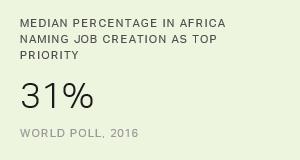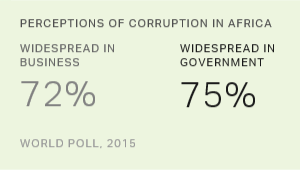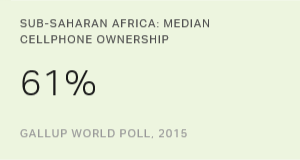Story Highlights
- 31% say creating new jobs is the most important issue facing governments
- Healthcare, agriculture and education are also top priorities
- Improving security and electricity rank lower
WASHINGTON, D.C. -- U.S. and African leaders meet this week at the second annual U.S.-Africa Business Forum to focus on increased trade and investment -- two prerequisites for the job creation that residents across sub-Saharan Africa currently see as the most important priority for their governments.
| Median | |||||||||||||||||||||||||||||||||||||||||||||||||||||||||||||||||||||||||||||||||||||||||||||||||||
|---|---|---|---|---|---|---|---|---|---|---|---|---|---|---|---|---|---|---|---|---|---|---|---|---|---|---|---|---|---|---|---|---|---|---|---|---|---|---|---|---|---|---|---|---|---|---|---|---|---|---|---|---|---|---|---|---|---|---|---|---|---|---|---|---|---|---|---|---|---|---|---|---|---|---|---|---|---|---|---|---|---|---|---|---|---|---|---|---|---|---|---|---|---|---|---|---|---|---|---|
| % | |||||||||||||||||||||||||||||||||||||||||||||||||||||||||||||||||||||||||||||||||||||||||||||||||||
| New jobs | 31 | ||||||||||||||||||||||||||||||||||||||||||||||||||||||||||||||||||||||||||||||||||||||||||||||||||
| Healthcare | 16 | ||||||||||||||||||||||||||||||||||||||||||||||||||||||||||||||||||||||||||||||||||||||||||||||||||
| Agriculture | 13 | ||||||||||||||||||||||||||||||||||||||||||||||||||||||||||||||||||||||||||||||||||||||||||||||||||
| Education | 12 | ||||||||||||||||||||||||||||||||||||||||||||||||||||||||||||||||||||||||||||||||||||||||||||||||||
| Corruption | 9 | ||||||||||||||||||||||||||||||||||||||||||||||||||||||||||||||||||||||||||||||||||||||||||||||||||
| Security | 5 | ||||||||||||||||||||||||||||||||||||||||||||||||||||||||||||||||||||||||||||||||||||||||||||||||||
| Electricity | 4 | ||||||||||||||||||||||||||||||||||||||||||||||||||||||||||||||||||||||||||||||||||||||||||||||||||
| Other | 2 | ||||||||||||||||||||||||||||||||||||||||||||||||||||||||||||||||||||||||||||||||||||||||||||||||||
| Asked among adults aged 15 and older in 21 countries in 2016 | |||||||||||||||||||||||||||||||||||||||||||||||||||||||||||||||||||||||||||||||||||||||||||||||||||
In 2016, Gallup asked residents of 21 African countries which, out of seven issues, is the most important for their respective country's government to address in the next 12 months. Jobs is easily the top issue, with a median of nearly one-third across all countries saying their government should prioritize creating new ones. At least one in eight Africans mentioned improving healthcare (16%), agriculture (13%) and education (12%). Although corruption, security and electricity are important issues throughout the region, fewer Africans mention them.
Mauritius, Botswana, Republic of the Congo Value Job Creation Most
Residents in 13 countries rated job creation as the most pressing issue, including about half of the population in Mauritius (51%), Botswana (47%) and Republic of the Congo (46%). According to Trading Economics, Mauritius' unemployment rate in early 2015 was as high as 8.7% but dipped to 7.6% in January 2016. Botswana, which has historically relied on the diamond industry to fuel its economy, is expected to have an unemployment rate of over 22% according to Trading Economics.
According to the World Bank, sputtering global commodity prices in sub-Saharan Africa caused economic growth to shrink to 3.4% in 2015 from 4.6% in 2014. Earlier this year, the World Bank also lowered its 2016 forecast to 2.5%, down from the 3% it estimated at the beginning of the year. The 2.5% economic increase would be the lowest since the global financial crisis.
| Job creation is top issue | |||||||||||||||||||||||||||||||||||||||||||||||||||||||||||||||||||||||||||||||||||||||||||||||||||
|---|---|---|---|---|---|---|---|---|---|---|---|---|---|---|---|---|---|---|---|---|---|---|---|---|---|---|---|---|---|---|---|---|---|---|---|---|---|---|---|---|---|---|---|---|---|---|---|---|---|---|---|---|---|---|---|---|---|---|---|---|---|---|---|---|---|---|---|---|---|---|---|---|---|---|---|---|---|---|---|---|---|---|---|---|---|---|---|---|---|---|---|---|---|---|---|---|---|---|---|
| % | |||||||||||||||||||||||||||||||||||||||||||||||||||||||||||||||||||||||||||||||||||||||||||||||||||
| Mauritius | 51 | ||||||||||||||||||||||||||||||||||||||||||||||||||||||||||||||||||||||||||||||||||||||||||||||||||
| Botswana | 47 | ||||||||||||||||||||||||||||||||||||||||||||||||||||||||||||||||||||||||||||||||||||||||||||||||||
| Republic of the Congo | 46 | ||||||||||||||||||||||||||||||||||||||||||||||||||||||||||||||||||||||||||||||||||||||||||||||||||
| Democratic Republic of the Congo | 38 | ||||||||||||||||||||||||||||||||||||||||||||||||||||||||||||||||||||||||||||||||||||||||||||||||||
| Ivory Coast | 38 | ||||||||||||||||||||||||||||||||||||||||||||||||||||||||||||||||||||||||||||||||||||||||||||||||||
| Mauritania | 37 | ||||||||||||||||||||||||||||||||||||||||||||||||||||||||||||||||||||||||||||||||||||||||||||||||||
| Senegal | 36 | ||||||||||||||||||||||||||||||||||||||||||||||||||||||||||||||||||||||||||||||||||||||||||||||||||
| Guinea | 36 | ||||||||||||||||||||||||||||||||||||||||||||||||||||||||||||||||||||||||||||||||||||||||||||||||||
| Togo | 33 | ||||||||||||||||||||||||||||||||||||||||||||||||||||||||||||||||||||||||||||||||||||||||||||||||||
| Ghana | 32 | ||||||||||||||||||||||||||||||||||||||||||||||||||||||||||||||||||||||||||||||||||||||||||||||||||
| Nigeria | 31 | ||||||||||||||||||||||||||||||||||||||||||||||||||||||||||||||||||||||||||||||||||||||||||||||||||
| Benin | 27 | ||||||||||||||||||||||||||||||||||||||||||||||||||||||||||||||||||||||||||||||||||||||||||||||||||
| Cameroon | 27 | ||||||||||||||||||||||||||||||||||||||||||||||||||||||||||||||||||||||||||||||||||||||||||||||||||
| 2016 | |||||||||||||||||||||||||||||||||||||||||||||||||||||||||||||||||||||||||||||||||||||||||||||||||||
Healthcare a Top Issue in Africa; Security a Concern in Some Areas
After creating new jobs, Africans would like to see their governments address healthcare. Burkinabes are the most likely to mention this as the top issue (31%). Healthcare is also a top issue for upwards of one in five in Togo (24%), Ivory Coast (22%), the Republic of the Congo (21%), Cameroon (20%) and Mauritania (20%).
This largely reflects the tough, ongoing fight in Africa against many diseases, including HIV/AIDS, malaria and tuberculosis. In 2016, two-thirds of the world's new HIV infections were in sub-Saharan Africa, according to the World Health Organization (WHO). More than 90% of the world's newly diagnosed malaria cases are also in Africa. According to the WHO, of the world's 20 countries with the highest maternal mortality rates, 19 are in Africa.
| Healthcare is top issue | |||||||||||||||||||||||||||||||||||||||||||||||||||||||||||||||||||||||||||||||||||||||||||||||||||
|---|---|---|---|---|---|---|---|---|---|---|---|---|---|---|---|---|---|---|---|---|---|---|---|---|---|---|---|---|---|---|---|---|---|---|---|---|---|---|---|---|---|---|---|---|---|---|---|---|---|---|---|---|---|---|---|---|---|---|---|---|---|---|---|---|---|---|---|---|---|---|---|---|---|---|---|---|---|---|---|---|---|---|---|---|---|---|---|---|---|---|---|---|---|---|---|---|---|---|---|
| % | |||||||||||||||||||||||||||||||||||||||||||||||||||||||||||||||||||||||||||||||||||||||||||||||||||
| Burkina Faso | 31 | ||||||||||||||||||||||||||||||||||||||||||||||||||||||||||||||||||||||||||||||||||||||||||||||||||
| Togo | 24 | ||||||||||||||||||||||||||||||||||||||||||||||||||||||||||||||||||||||||||||||||||||||||||||||||||
| Ivory Coast | 22 | ||||||||||||||||||||||||||||||||||||||||||||||||||||||||||||||||||||||||||||||||||||||||||||||||||
| Republic of the Congo | 21 | ||||||||||||||||||||||||||||||||||||||||||||||||||||||||||||||||||||||||||||||||||||||||||||||||||
| Cameroon | 20 | ||||||||||||||||||||||||||||||||||||||||||||||||||||||||||||||||||||||||||||||||||||||||||||||||||
| Mauritania | 20 | ||||||||||||||||||||||||||||||||||||||||||||||||||||||||||||||||||||||||||||||||||||||||||||||||||
| Sierra Leone | 18 | ||||||||||||||||||||||||||||||||||||||||||||||||||||||||||||||||||||||||||||||||||||||||||||||||||
| Guinea | 17 | ||||||||||||||||||||||||||||||||||||||||||||||||||||||||||||||||||||||||||||||||||||||||||||||||||
| Liberia | 16 | ||||||||||||||||||||||||||||||||||||||||||||||||||||||||||||||||||||||||||||||||||||||||||||||||||
| Senegal | 16 | ||||||||||||||||||||||||||||||||||||||||||||||||||||||||||||||||||||||||||||||||||||||||||||||||||
| Benin | 15 | ||||||||||||||||||||||||||||||||||||||||||||||||||||||||||||||||||||||||||||||||||||||||||||||||||
| South Sudan | 15 | ||||||||||||||||||||||||||||||||||||||||||||||||||||||||||||||||||||||||||||||||||||||||||||||||||
| Madagascar | 14 | ||||||||||||||||||||||||||||||||||||||||||||||||||||||||||||||||||||||||||||||||||||||||||||||||||
| Malawi | 13 | ||||||||||||||||||||||||||||||||||||||||||||||||||||||||||||||||||||||||||||||||||||||||||||||||||
| 2016 | |||||||||||||||||||||||||||||||||||||||||||||||||||||||||||||||||||||||||||||||||||||||||||||||||||
Adults in Kenya (24%), South Sudan (19%), Madagascar (18%), Ethiopia (18%) and Mauritius (12%) are among the most likely to say improving security is important. Kenya's government has been fighting the militant group, known as Al-Shabab since 2012; South Sudan has been ravaged by civil war for the last few years; and anti-government protesters in Ethiopia this year have had several fatal clashes with security forces. But Mauritius residents wanting more security is perhaps surprising -- the island nation in the Indian Ocean is a tourist hot spot, visited mostly by Europeans. According to the U.S. State Department, Mauritius has a crime rating of "medium" and its capital city, Port Louis, which has a population of 150,000, has a lower crime rate than most American cities that are similar in size.
Bottom Line
Many of the issues Africans see as the most important -- including healthcare and agriculture -- are on the agenda for government leaders at this week's summit, according to the U.S. Department of Commerce. The major focus is on increasing "commercial and financial ties" between U.S. and African countries. Diversifying African economies, strengthening human capital and fighting corruption will be important ingredients in forging strong partnerships with private American companies and U.S. government organizations. Jobs, education and healthcare in Africa are all related, and an agreement in one sector could help boost progress in another.
Survey Methods
Results are based on face-to-face interviews with 1,000 adults, aged 15 and older in each country, conducted in 2016. For results based on the total sample of national adults, one can say with 95% confidence that the maximum margin of sampling error ranges from ±3.4 to ±4.3 percentage points. The margin of error reflects the influence of data weighting. In addition to sampling error, question wording and practical difficulties in conducting surveys can introduce error or bias into the findings of public opinion polls.



